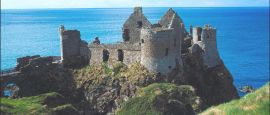Northern Ireland History, Language and Culture
History of Northern Ireland
Sectarian divisions between its Catholics and Protestants scar the history of Northern Ireland where huge murals depict conflicts past and present, but increasingly document peace and cultural diversity.
In the 17th century, the so-called Ulster Plantations saw Scottish Presbyterian settlers come to the region although English monarchs before and after laid claim to it, often ruthlessly.
The 1920 Partition of Ireland gave home rule to its six north-eastern counties and created the Irish Free State (now the sovereign Republic of Ireland) ruled from Dublin. This remains the root cause for the ethno-nationalist violence that overshadowed Northern Ireland for much of the 20th century. The most strife-ridden period, from 1968 to 1998, is known as the Troubles.
The 1970s brought civil disorder, internment, troops on the streets and bombing campaigns that spread throughout the United Kingdom before peace negotiations began in the mid-1990s. The Good Friday Agreement (officially the Belfast Agreement) was signed on 10 April 1998 and the Northern Ireland Assembly was set up in 1998.
Representatives of all parties took part and, although the Assembly was largely suspended from 2000 to 2007, a historic meeting between Gerry Adams of the republican Sinn Féin and ardent nationalist Ian Paisley of the Democratic Unionist Party took place in 2007 as the Assembly was restored.
Sadly, while life goes on relatively peacefully, it would be false to claim the scars of the Troubles have completely healed. Social tensions have raised their heads periodically since the restoration of the Assembly, notably in December 2012 and early 2013, when a decision to limit the number of days the Union Flag flew outside Belfast City Hall was met with violent demonstrations. The Northern Ireland Assembly was again suspended in 2017 and remains so after policy disagreements and the resignation of Martin McGuinness.
Did you know?
• Having suffered 33 bomb attacks during the Troubles, Belfast’s four-star Europa Hotel continues to be known as the most bombed hotel in Europe.
• Louise Walsh’s sculpture, Monument to the Unknown Woman Worker on Great Victoria Street in Belfast is a testament to women’s rights.
• Belfast City Airport was renamed in 2006 in honour of football hero George Best.




 You know where
You know where